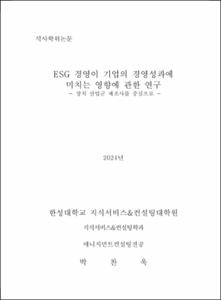ESG 경영이 기업의 경영성과에 미치는 영향에 관한 연구
= Research on the impact of ESG management on a company's business performance : Focusing on manufacturers in the device industry
- Type
- Thesis
- Alternative Title
- 장치 산업군 제조사를 중심으로
- Advisor
- 정진택
- Department
- 지식서비스&컨설팅대학원 지식서비스&컨설팅학과
- Issued Date
- 2024
- Publisher
- 한성대학교 지식서비스&컨설팅대학원
- Appears in Collections:
- 지식서비스&컨설팅학과 > 1. Thesis
- Files in This Item:
-
-
Download
 200000730721.pdf
기타 데이터 / 972.87 kB / Adobe PDF
200000730721.pdf
기타 데이터 / 972.87 kB / Adobe PDF
-
Items in Repository are protected by copyright, with all rights reserved, unless otherwise indicated.